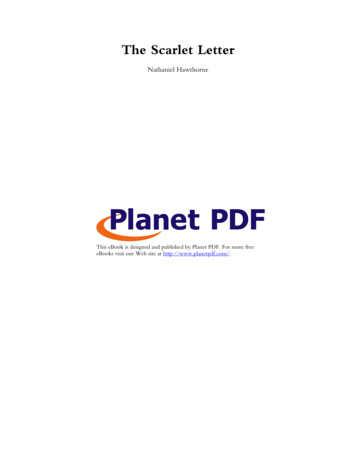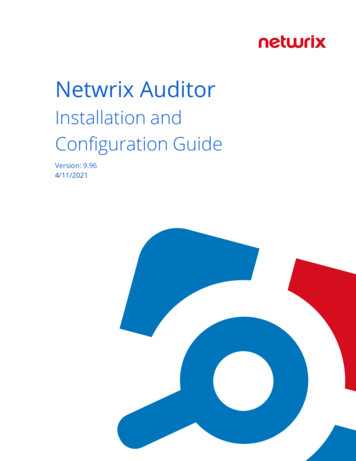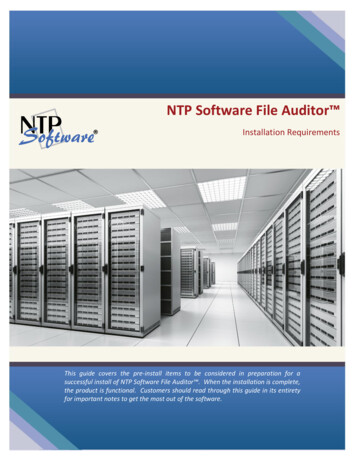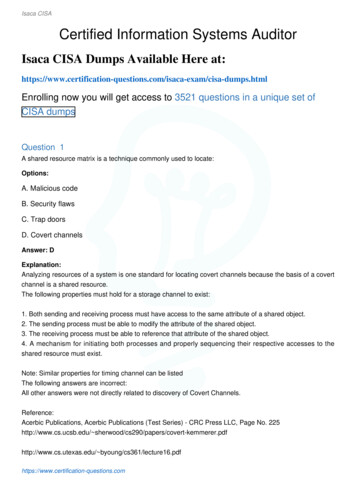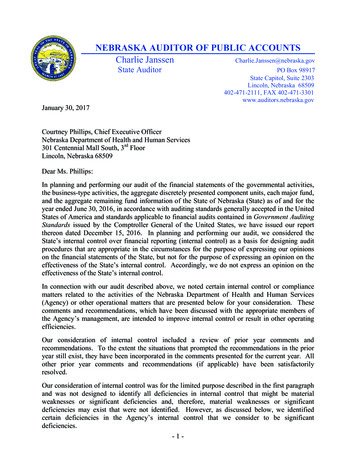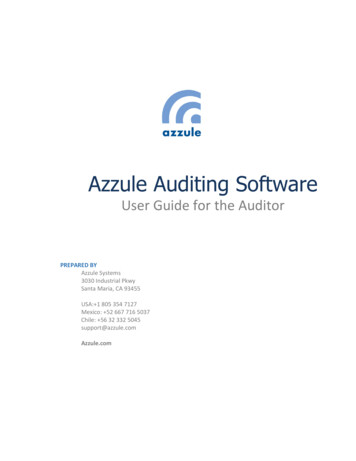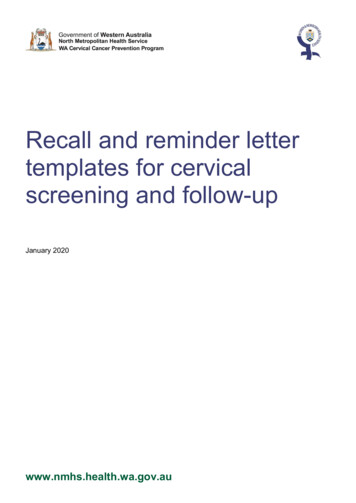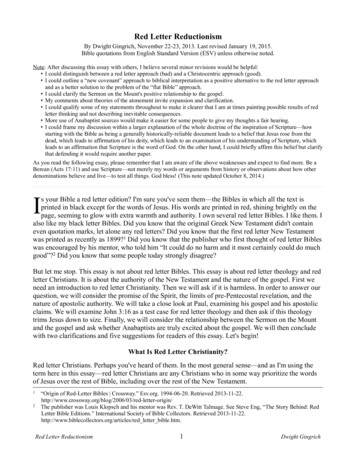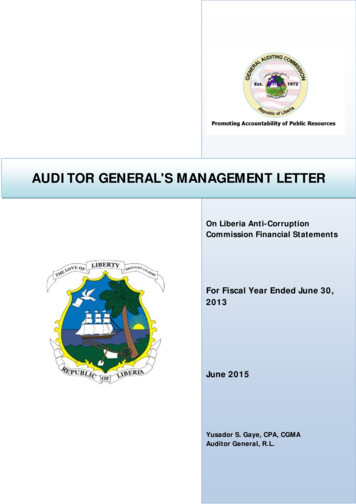
Transcription
AUDITOR GENERAL'S MANAGEMENT LETTEROn Liberia Anti-CorruptionCommission Financial StatementsFor Fiscal Year Ended June 30,2013June 2015Yusador S. Gaye, CPA, CGMAAuditor General, R.L.
Acronyms eaningAuditor GeneralCentral Bank of LiberiaCertified Fraud ExaminerChartered Global Management AccountantControl Objective for Information TechnologyCommittee on Sponsoring Organizations of the Treadway CommissionCertified Public AccountantDeputy Auditor GeneralGeneral Auditing CommissionGovernment of LiberiaInformation Communication TechnologyInternational financial Reporting StandardsInternational Organization of Supreme Audit InstitutionsInternational Public Sector Accounting StandardsInternational Standard of Supreme Audit InstitutionsInformation TechnologyLiberia Anti-Corruption CommissionMinistry of JusticeNational Social Security and Welfare CorporationPublic Finance ManagementPublic Procurement and Concessions CommissionRepublic of LiberiaUnited States DollarsLiberian Dollars
Auditor General‘s Management Letter on Liberia Anti-Corruption CommissionFinancial Statements for Fiscal Year Ended June 30, 2013Table of Contents12DETAILED REPORT . 41.1Introduction . 41.2Mandate of LACC . 41.3Key Personnel of LACC . 41.4Audit Objectives. 41.5Audit Methodology . 51.6Limitation of Responsibility . 6DETAILED FINDINGS AND RECOMMENDATIONS . 72.1Financial Related Issues . 72.1.1Accounting Policies and Explanatory Notes . 72.1.2Bank Reconciliation. 82.1.3Honorarium . 92.1.4Consultancy Fees . 102.1.5Reallocation of Expenditure Items . 112.1.6Expenditures . 132.2Control Related Issues. 152.2.1Operational Plan. 152.2.2Disaster Recovery Plan. 162.2.3Risk Management Policy. 162.2.4Fixed Asset Register . 172.2.5Information Technology Policy. 182.2.6Internal Audit Independence . 192.2.7Documenting Information . 191Promoting Accountability of Public Resources
Auditor General‘s Management Letter on Liberia Anti-Corruption CommissionFinancial Statements for Fiscal Year Ended June 30, 2013Management Letter: On the Financial Statements audit of the Liberia Anti-CorruptionCommission, for the fiscal Period 2012/2013.Cllr. James N. Verdier Jr.Executive ChairpersonLiberia Anti-Corruption CommissionMonrovia, Liberia20 June 2015Dear Cllr. Verdier:We have completed the audit of the Liberia Anti-Corruption Commission financial statements for theyear ended 30 June 2013. The purpose of this letter is to bring to your attention the findings thatwere revealed during the audit.The audit was conducted in accordance with the International Standards of Supreme AuditInstitutions (ISSAIs). These standards require that the audit is planned and performed so as toobtain reasonable assurance that, in all material respects, fair presentation is achieved in the annualfinancial statements. Our audit also took cognizance of the Auditor General’s mandate as providedfor under Chapter 53.3 of the Executive Laws of 1972, the Public Procurement ConcessionCommission (PPCC) Acts of 2010, the Revenue Code of 2000, and the Public Financial Management(PFM) Act of 2009 and its regulations.An audit includes: Examination on a test basis of evidence supporting the amounts and disclosures inthe financial statements; Assessment of the accounting principles used and significant estimates made bymanagement; and Evaluation of the overall financial statements presentation.Examination on a test basis of evidence supporting compliance in all material respects with therelevant laws and regulations which came to our attention and are applicable to financial matters.The matters mentioned in this letter are therefore those that were identified through testsconsidered necessary for the purpose of the audit and it is possible that there might be othermatters that were not identified.The financial statements, maintenance of effective control measures and compliance with laws andregulations are the responsibility of the Management of the LACC. Our responsibility is to expressour opinion on these financial statements.The audit findings which were identified during the course of the audit are included below.2Promoting Accountability of Public Resources
Auditor General‘s Management Letter on Liberia Anti-Corruption CommissionFinancial Statements for Fiscal Year Ended June 30, 20131 DETAILED REPORT1.11.1.1IntroductionThe audit of the Liberia Anti-Corruption Commission financial statements for thefiscal period 2012/2013 was commissioned by the Auditor-General on July 1, 2014,under her statutory mandate as provided for under Chapter 53.3 of the ExecutiveLaw of 1972. The audit covered the fiscal period July 1, 2012 to June 30, 2013 andthe purpose of this Management Letter is to bring to your attention the findingsrevealed during the audit.1.21.2.1Mandate of LACCThe Liberia Anti-Corruption Commission was created by an Act of NationalLegislature, of the Republic of Liberia in 2008. The purpose is to implementappropriate measures and undertake programs geared toward investigating,prosecuting and preventing acts of corruptions, including educating the public aboutthe ills of corruption and the benefits of its eradication.1.31.3.1Key Personnel of LACCFor the period under review, the key personnel of the LACC are indicated in the tablebelow:Table 1: Key Management Personnel 2010-2013NameRankCllr. Frances Johnson AllisonChairpersonHon. Joseph k. AcquiVice ChairCllr. M. Osman KannehCommissioner/ Education &PreventionHon. Sandra Howard-KendorCommissionerCllr. J. Augustine ToeCommissionerMr. Daniel B. TipaysonExecutive DiretorMr. James K. kingsleyProgram/AdministrationMr. Bernard NagbeComptrollerDinnamae GulleyAccountant1.41.4.1Period of Service2010-20132010-20132010-2013Office LocationGurley Street, MonroviaGurley Street, MonroviaGurley Street, Audit ObjectivesThe objectives of the audit are derived from the enabling enactment of the GAC aswell as the LACC's objectives as stipulated in the LACC’s vision and mission. GAC’senabling enactment, Chapter 53, Executive Law of 1972, Section 53 (7), requires theAG to call the attention of the National Legislature to the following matters, ifrelevant to any audit undertaken: Any officer or employee who has willfully or negligently failed tocollect or receive monies belonging to Government; Any public monies not duly accounted for and paid into an authorizeddepository;4Promoting Accountability of Public Resources
Auditor General‘s Management Letter on Liberia Anti-Corruption CommissionFinancial Statements for Fiscal Year Ended June 30, 2013 Any appropriation that was exceeded or applied to an account; Any deficiency or loss throughperson or group of person; andfraud, default, or mistake of any Inadequate or ineffective internal control of public monies and assets. PFM Regulations C.9. section 3 States that, ‘Delegation of authority toperform functions or duties under these regulations does not diminishthe accountability of the Head of Government Agency or relieve himor her of responsibilities provided in these regulations’.1.4.2The main objective of the audit is to express an opinion on the LACC’s FinancialStatements for the financial year 2012/13.1.51.5.1Audit MethodologyThe audit was conducted in accordance with the International Standards of SupremeAudit Institutions (ISSAIs). Those standards require that we plan and perform theaudit to obtain reasonable assurance that the records on the financial statements ofthe LACC are free of material misstatements. In furtherance of this, we undertookaudit procedures as would enable us to attain the above objectives.1.5.2Our audit also took cognizance of the requirements under the Auditor General’sMandate as spelt out under Sections 53.3 of the Executive Law of 1972. Our auditapproach included discussions with management, test checks on areas weconsidered as high risk.1.5.3While our audit is not directed to reporting the following, we will report these itemsif we become aware of them during the course of the audit: Non- effective performance of operations- relates to Management ofthe LACC’s responsibility to undertake activities in a non- effective andefficient manner. Instances of non-compliance with authorities- relates to Managementof the LACC’s non-exercise of responsibility to use resources, andfulfill accountability requirements, in accordance with applicableagreements, laws and regulations governing the agency’s financialstatements compilation. Waste – relates to Management of the LACC non-exercise ofresponsibility to obtain and apply resources in an economical manner,without any public money being wasted. Instances of abuse- relates to Management of the LACC non- exercise5Promoting Accountability of Public Resources
Auditor General‘s Management Letter on Liberia Anti-Corruption CommissionFinancial Statements for Fiscal Year Ended June 30, 2013of responsibility to meet the expectations of the National Legislatureand the public as they relate to appropriate standards of behavior.1.61.6.1Limitation of ResponsibilityWe reviewed the systems and management controls operated by the LACC only tothe extent we considered necessary for the effective performance of this audit. As aresult, our audit may not have detected all weaknesses that existed or allimprovements that could be made.6Promoting Accountability of Public Resources
Auditor General‘s Management Letter on Liberia Anti-Corruption CommissionFinancial Statements for Fiscal Year Ended June 30, 20132 DETAILED FINDINGS AND RECOMMENDATIONS2.1Financial Related Issues2.1.1Accounting Policies and Explanatory NotesObservationAccording to paragraph 1.3.30 of the IPSAS Cash Basis of Accounting, the notes tothe financial statements of an entity should: (a) Present information about the basisof preparation of the financial statements and the specific accounting policiesselected and applied for significant transactions and other events; and (b) Provideadditional information which is not presented on the face of the financial statementsbut is necessary for a fair presentation of the entity’s cash receipts, cash paymentsand cash balances.2.1.1.12.1.1.2In addition, the notes should be in the format as exhibited in appendix 1 illustrationof the requirements of part 1 of the standard for a single government entity asadopted by GoL in 2009.2.1.1.3We observed that the Financial Statements presented by the Liberia Anti-CorruptionCommission did not disclose the notes to the financial statement in the formatexhibited in appendix 1, illustration of the requirements of the standard for a singlegovernment entity as adopted by the Government of Liberia in 2009. The notes didnot contain specific accounting policies selected and applied for significanttransactions and other events.RiskThe failure of the Comptroller to properly disclose the notes could result to thefinancial statements not fairly presenting the events and transactions that occurredduring the accounting period.2.1.1.4RecommendationThe LACC Financial Statements should be prepared in compliance with therequirements of the International Public Sector Accounting Standard (IPSAS) CashBasis of Accounting as was adopted in 2009 by the Government of Liberia.2.1.1.5Management ResponseBe informed that the format exhibited in appendix 1, after the adoption of IPSAS in2009, were not included in the templates provided to the LACC by the Ministry ofFinance. This was the information we shared with you verbally when your auditengagement manager approached us. Appendix 1, was recently introduced andprovided to the LACC during the consummation of the 2013-2014 IPSAS reportreleased to the Ministry of Finance and the GAC. This new format is also beingreleased this current fiscal year and we are performing our duty as required by LAW.The records are there and you can confirm with the Ministry of Finance about2.1.1.67Promoting Accountability of Public Resources
Auditor General‘s Management Letter on Liberia Anti-Corruption CommissionFinancial Statements for Fiscal Year Ended June 30, 2013appendix 1, being available in 2010-2011 reporting period. We are enclosing copiesof the 2013-2014 IPSAS report with the modified template, appendix 1, with all notesand disclosures. We hope that this clarifies your doubt about our ability to presentthe statements accurately as required by LAW.Auditor General’s PositionThe IPSAS Cash Basis of Accounting provides a structure for the presentation ofaccounting policies and notes to the financial statements. In the absence of notes tothe financial statements, the financial statements are not in compliance with thestandard. We therefore maintain our recommendation.2.1.1.72.1.2Bank ReconciliationObservationIn terms of the Committee of Sponsoring Organization of the Treadway Commission(COSO) framework, there must be segregation of duties in the processing oftransactions. This entails that transactions should not be commenced and completedby the same person to ensure segregation of duty. In addition, page 5 of the LACCfinancial handbook provides that there shall be a comptroller who prepares andcontrol monthly financial reports including the program budget summary and thereconciliation statement. The chief accountant assists with the reconciliation of bankbalances ensuring transactions are correctly processed to ensure segregation ofduties. Furthermore, in order to ensure segregation of duty in the preparation ofreconciliation statement, the preparer of the reconciliation statement must be clearlyindicated on the reconciliation together with the supervisor before the executivedirector approves it.2.1.2.12.1.2.2Contrary to the above, we noted during the audit that the comptroller was preparingthe reconciliations instead of the chief accountant. This indicated that the comptrollercommenced the transactions and performs the reconciliations. The reconciliationswould then be reviewed by Executive Director.RiskThe absence of the segregation of duties in the preparation of the reconciliationstatements could result in errors and omission not being identified on a timely basis.2.1.2.3RecommendationThe comptroller must comply with the provisions of the financial handbook of theLACC in the preparation of the reconciliation statements. This would ensure that thepreparer is separate from the reviewer. The preparer and reviewer must be clearlyindicated on the face of the reconciliation statements.2.1.2.4Management’s First ResponseEverything we’ve done is consistent with the LACC Financial handbook. See Section7.1.2 The Reconciliation Sheet (RS) “the Comptroller is responsible for producing the2.1.2.58Promoting Accountability of Public Resources
Auditor General‘s Management Letter on Liberia Anti-Corruption CommissionFinancial Statements for Fiscal Year Ended June 30, 2013reconciliation on a monthly basis as part of the month-end routines and filling it in abinder together with cash count and bank statement. The executive Director shouldcontrol and sign the hard copy of the RS. Please see attached sample of the LACCreconciliation responding to your query and meeting directly what is in our FinancialHandbook.2.1.2.6Management’s Second ResponseWe take due note of the Auditor General position on Bank Reconciliation. We arenow including Prepared by and Reviewed by and Approved by on the BankReconciliation Sheet.2.1.2.7Auditor General’s PositionWe acknowledge Management’s acceptance of our observation and we will make afollow -up during the next audit.2.1.3HonorariumObservationIn terms of part E.6 of the PFM Act of 2009, an expenditure shall not be incurred, acommitment or a charge shall not be made against an appropriation except at therequest of the appropriate head of a Ministry, a Government agency or a spendingunit for which the appropriation was made or his/her authorized deputy. Additionally,regulation E 8 (C) states no reallocation may be made from or into PersonnelExpenditure from other major object of expenditure or between items withinpersonnel expenditure without written approval of the Civil Service Agency.2.1.3.12.1.3.2According to the LACC financial handbook, the program code differentiates costbetween programs and budget code defines activity for which was incurred.Transactions should be processed under the budget code to which it relates. Thiswould ensure effective expenditure control.2.1.3.3We noted during the audit instances of expenditure reallocated in the Honorariumcode amounting to US 28,877.17.RiskThe expenditure incurred reallocated in the Honorarium code could lead tooverstatement or understatement of the expenditure in the respective budget codeto which they relate.2.1.3.4RecommendationThe comptroller should seek authority to transfer funds from one budget code withexcess funds to another with a shortfall before incurring expenditure. This wouldensure that expenditure is charged to the rightful code and prevent unauthorizedreallocations.2.1.3.59Promoting Accountability of Public Resources
Auditor General‘s Management Letter on Liberia Anti-Corruption CommissionFinancial Statements for Fiscal Year Ended June 30, 20132.1.3.62.1.3.72.1.3.82.1.3.92.1.4The comptroller should do a reclassification of US 28,877.17 to Honorarium. SeeAnnexure 1.Management’s ResponseAs we describe in the earlier response for 2011-2012, the LACC has four layers ofapproval and these four layers do not allow the Comptroller to authorize atransaction. There four layers provide authority to the Comptroller to release funds.The LACC Financial System complies strictly with the PFM Act of 2009. The ExecutiveChairperson has the final authority in the release of funds at the Commission. Pleaserevisit the processes described in 2001-2012 Audit response by the LACC. TheProgram Manager for Administration provides the first level of approval, the secondlevel is the LACC Executive Director, and the third level is the Category B signatureon checks (the Comptroller only signs in the absence of the Executive Director) thefourth and final layer of approval rests with the LACC Executive Chairperson.Note: 2.1.4.1 The LACC has in Section 13.1 of its Act of 2008, Financial Autonomyand Operational Independence. We do not operate under the Civil Service and needno approval from the Civil Service Agency to implement our fiscal year budget.Please see attached the LACC Act of 2008 section 13.1.Auditor General’s PositionWe have reviewed Section 13.1 of the LACC Act of 2008 and have therefore modifiedour recommendation as it relates to the seeking of CSA’s authority. However,Regulation E.8 (2) and (3) of the PFM Act of 2009 require Government entities toseek approval to reallocate from one budgeted code to another from the DeputyMinister for Budget. The Deputy Minister for Budget may delegate the power toauthorize reallocations to head of government agency, stating clearly the terms andextent of such delegation. Therefore, we maintain our recommendation.Consultancy Fees2.1.4.12.1.4.22.1.4.310ObservationAccording to the LACC financial handbook, the program code differentiates costbetween programs and budget code defines activity for which was incurred.Transactions should be processed under the budget code to which it relates. Thiswould ensure effective expenditure control.We noted during the audit instances of expenditure reallocated in the ProfessionalFees code amounting to US 12,595.00. See Annexure 2RiskThe expenditure incurred reallocated to the Professional Fees code could lead tooverstatement or understatement of the expenditure in the respective budget codeto which they relate.Promoting Accountability of Public Resources
Auditor General‘s Management Letter on Liberia Anti-Corruption CommissionFinancial Statements for Fiscal Year Ended June 30, endationThe Management of LACC should seek authority to transfer funds from one budgetcode with excess funds to another with a shortfall before incurring expenditure. Thiswould ensure that expenditure is processed in the rightful code and preventunauthorized reallocations.The comptroller should effect a reclassification of US 12,595.00 to the ProfessionalFees code.Management’s Response2.1.4.1 The LACC has in Section 13.1 of its Act of 2008, Financial Autonomy andOperational Independence. We do not operate under the Civil Service and need noapproval from the Civil Service Agency to implement our fiscal year budget. Pleasesee attached the LACC Act of 2008 section 13.1.The Executive Chairperson approves all LACC financial transaction. Please see sampleof the LACC payment process, which includes the payment voucher and returnedcheck from the bank to authenticate LACC response.Auditor General’s PositionWe have reviewed Section 13.1 of the LACC Act of 2008 and have therefore modifiedour recommendation as it relates to the seeking of CSA’s authority. However,Regulation E.8 (2) and (3) of the PFM Act of 2009 require Government entities toseek approval to reallocate from one budgeted code to another from the DeputyMinister for Budget. The Deputy Minister for Budget may delegate the power toauthorize reallocations to head of government agency, stating clearly the terms andextent of such delegation. Therefore, we maintain our recommendationReallocation of Expenditure ItemsGeneral Expenses2.1.5.1ObservationRegulation E.6 of the PFM Act of 2009 states that,’’ (1) a head of government agencyshall exercise budgetary control over the activities of the government agency inaccordance with these regulations and the procedures for budgetary control shall bestated in Accounting Regulations supplemented by the accounting instructions forthat government Agency’’.2.1.5.2’’ (2) Expenditure shall not be incurred, a commitment or a charge shall not be madeagainst an appropriation except at the request of the appropriate head of a Ministry,a Government agency or a spending unit for which the appropriation was made orhis/her authorized deputy’’.2.1.5.3Contrary to the above, we noted during the audit instances of expenditure being11Promoting Accountability of Public Resources
Auditor General‘s Management Letter on Liberia Anti-Corruption CommissionFinancial Statements for Fiscal Year Ended June 30, 2013reallocated from one budget code to another amounting to US 16,946.12. SeeAnnexure 3-82.1.5.42.1.5.52.1.5.62.1.5.7RiskThe expenditure incurred and reallocated in the above line items codes could lead tooverstatement or understatement of the expenditure in the respective budget codeto which it relates.Effecting transactions without evidence of approval from the appropriate authoritycould result to misapplication of entrusted funds.RecommendationThe Management of LACC should seek authority to transfer funds from one budgetcode with excess funds to another with a shortfall before incurring expenditure. Thiswould ensure that expenditure is processed in the rightful code and preventunauthorized reallocations.The comptroller should do a reclassification as reflected in the table to the respectivecodes amounting to US 16,946.12.Management’s First nication, Internet & PostageFor all the transaction listed in Annexure 3, I am attaching copies of the voucher andreturn checks for you to authenticate the approval of the LACC ExecutiveChairperson. The LACC Executive Chairperson approves all Financial Transactions. Allaccounts classification, budget code and class are stated clearly on the face of eachvoucher that becomes approved given the four approval described in previousresponses.Fuel & Lubricant - VehiclesThe highest authority at the LACC duly authorized the expenditure for Fuel &Lubricant you mentioned, as you have referred to annexure 4, the highest authorityat the LACC approves the voucher numbers 144, 196, 392, 502, 514, and 515. Weare enclosing copies of these vouchers and each returned check for your perusal.Fuel & Lubricant-GeneratorFor annexure 5, the highest authority at the LACC also approved the vouchersindicated. We have noted a series of petty cash payment ranging between US 23 toUS 95. For petty cash transaction the Executive Director provides the finalauthorization. You may refer to 6.3.1 of the LACC Financial handbook.Repairs & Maintenance- VehicleThe evidence of authorization on a simple voucher has to be the approval of thatvoucher. All said vouchers listed in Annexure 6 were approved by the highestPromoting Accountability of Public Resources
Auditor General‘s Management Letter on Liberia Anti-Corruption CommissionFinancial Statements for Fiscal Year Ended June 30, 2013authority. Please see attached these vouchers and the return checks.2.1.5.122.1.5.132.1.5.14Audit FeesAll transaction at the LACC is approved on the payment vouchers referenced inannexure 9 before they are incurred. The Chairperson of the LACC approves everytransaction that is incurred. That is why we are enclosing the voucher (s) referencedin annexure 9. We hope that it clears up your doubt as regards approval.Repairs & Maintenance- Machinery EquipmentThe evidence of authorization you referred to in annexure 10, are the paymentvouchers you listed. We shall include the return checks on those vouchers to furtherjustify the authorization of said payments.Management’s Second ResponseThe GAC ‘’ Overall Audit Strategy ‘’ (AUDITING PLANNING MEMORANDUM) # 4Planned Audit Approach IV. Materiality Amount:2010-20112011-20122012-2013 13,391.00 17, 412.00 20,197.002.1.5.15The about materiality threshold should be basis and benchmark for the relevance toyour query. With the above, your audit continues to cite transaction with in thenormal petty cash range and even amounts even less than 500 for competitivequotes. Are we considering this materiality and the transaction relevance to the auditstrategy?2.1.5.16We have initiated the reallocation of all transactions mentioned in your query.2.1.5.172.1.6Auditor General’s PositionThe International Standards of Supreme Audit Institutions ISSAI 1320 requires anauditor to consider quantitative and qualitative materiality. It is recommended thatqualitative materiality in the public sector gets an additional emphasis. Thequantitative materiality is calculated at two levels, which are at overall andPerformance materiality. At the end of the audit, the auditors will calculate the finalmateriality. Considering the above, our judgment regarding materiality was justified.We acknowledge your acceptance of our observation and we look forward to itsimplementation.ExpendituresNon- Compliance to the PPCC Act2.1.6.113ObservationAccording to Section 54.1 of the PPCC Act of 2010, the basic procedures for requestfor quotation are as follows: Quotations shall be requested for in writing from as many bidders asPromoting Accountability of Public Resources
Auditor General‘s Management Letter on Liberia Anti-Corruption CommissionFinancial Statements for Fiscal Year Ended June 30, 2013practicable, but from at least three (3) bidders.2.1.6.22.1.6.32.1.6.42.1.6.5 The request shall contain a clear statement of the requirements of theProcuring Entity as to quality, quantity, terms and time of delivery, as wellas any other special requirements. Bidders shall be given adequate time to prepare and submit theirquotations, but each bidder shall be permitted one quotation, which maynot be altered or negotiated. A purchase order shall be placed with the bidder that provided the lowestpriced quotation meeting the delivery and other requirements of theProcuring Entity.Contrary to Sections 54 of the PPCC Act of 2010, we could not find evidence of three(3) quotations attached to a sample of seven (8) tr
LACC Liberia Anti-Corruption Commission MOJ Ministry of Justice NASSCORP National Social Security and Welfare Corporation PFM Public Finance Management PPCC Public Procurement and Concessions Commission RL Republic of Liberia USD United States Dollars LD Liberian Dollars . Auditor General's Management Letter on Liberia Anti-Corruption .
